#Global refugee forum
Text
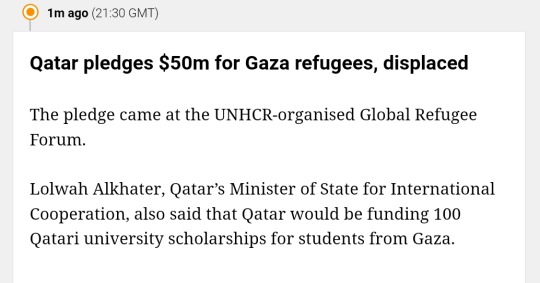
Qatar is pledging financial support for displaced Gazans and also 100 scholarships
#free gaza#free palestine#gaza strip#irish solidarity with palestine#palestine#gaza#news on gaza#al jazeera#boycott israel#israel#Qatar#Aid#UNHCR#Global Refugee Forum
14 notes
·
View notes
Text
Strengthening social cohesion and inclusion.
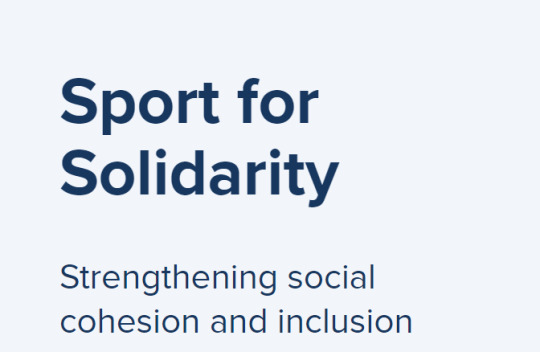
The project aims to strengthen the social cohesion of children under temporary and international protection and children of the host community through sports, and to identify children at risk through activities to be conducted under the Project and refer them to the relevant institutions.
Let's strengthen social cohesion and inclusion through sports among refugees and Turkish youth
#social cohesion#global refugee forum#global compact on refugees#sport#physical activity#turkey#refugee inclusion#host communities#sport for solidarity
0 notes
Text
Global Refugee Forum 2023 - Remarks by the United Nations High Commissioner for Refugees.
Speaker: Filippo Grandi, UN High Commissioner for Refugees
Global Refugee Forum (13-15 December 2023)

0 notes
Text
Editor’s Note: Sanne DeWitt is a microbiologist, geneticist, researcher, and author of a memoir: “I Was Born In An Old Age Home”. She has lived in Berkeley, California since 1957, where she moved for advanced studies in microbiology and genetics, and worked there until her retirement. The views expressed here are those of the author. View more opinion on CNN.CNN —
In 1957, I moved to Berkeley, California: a bastion of American liberalism that squarely aligns with my progressive values, and a hub of American scholarship that nurtured my academic quest and professional growth. I came here for advanced studies in microbiology and genetics. Since then, I have lived, worked as a scientist and retired in this community.
Over the 65 years that I have called this beautiful area home, I have occasionally encountered antisemitism, but these one-off incidents never succeeded in destroying my spirit. When I was four years old, Nazis burst into my bedroom and sent me and my family to Dachau, the first Nazi concentration camp. We were soon released and I was smuggled out of Germany by a Christian woman. After this harrowing experience, not much in the Bay Area could scare me.
But since the October 7 Hamas attack on Israel, the hatred towards Jews that I have seen in Berkeley terrifies me more than anything I have experienced while living here. I am still reeling from being called a liar at a Berkeley City Council meeting, where I asked for a proclamation to mark Holocaust Remembrance Day and spoke about October 7. The Jews at that meeting were circled and called “Zionist pigs” by menacing protesters.
We are approaching the holiday of Passover, which commemorates the freedom of the Israelites from Egyptian slavery and our formation as a free Jewish people in our own land. But this Passover is like no other in recent history, with scores of hostages still held in Gaza and Jews worldwide fearful for our future — including Jews in the US. We are facing the worst global antisemitism since the Holocaust and while it is not state-sanctioned as Nazism was, it is a threat going unchecked in California’s East Bay.
It is incredibly painful to see my neighbors vilify Jews, tear down posters of Jewish hostages in Gaza and not believe Jewish rape victims. In this hotbed, hatred and hostility have become normalized. Families have moved their children out of public schools. Jewish businesses have been vandalized and boycotted. And lies about Jews and Israel have gone unchecked and unchallenged in our public forums. Our local Jewish community is both horrified and petrified.
This onslaught of Jewish hatred cannot become the new normal. This epidemic must be treated as seriously as all other hatreds that our society is confronting, such as racism and homophobia. We need more education about Judaism and how the long, sordid history of antisemitism ties into other forms of hatred in our public schools.
We need colleges and universities to unequivocally denounce hate speech and actions directed at Jews. We need public officials to urge mutual respect, understanding and civil discourse during city council and town hall meetings.
I have seen where unchecked antisemitism can lead, when people will do nothing — or worse, join the mainstream, such as our German neighbors during Nazism. This Passover, I resolve with whatever time I have left in this world to fight for the safety of the Jewish people, in Berkeley and around the globe.
During Passover, we are commanded to tell the story of the exodus out of Egypt to our children. We believe in the lasting power of sharing this history with younger generations and reflecting on this hopeful new beginning. There is also lasting power in sharing my history as a Jewish refugee — and I invite my Berkeley neighbors to hear my story. Without understanding and acceptance, we are enslaved by our biases.
The hatred, violence and bigotry against the Jewish community cannot continue — for our shared future, we must confront it and root it out.
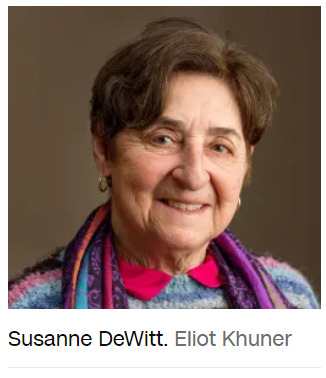
#jumblr#october 7#israel#antisemitism#frumblr#terrorism#usa diaspora#Jewish women#Shoah survivor#Pesach#Passover#Sanne DeWitt
121 notes
·
View notes
Text

🇺🇳🇵🇸🇮🇱 🚨
UN HIGH COMMISSIONER FOR REFUGEES CALLS FOR AN IMMEDIATE HUMANITARIAN CEASEFIRE IN GAZA
The United Nations High Commissioner for Refugees, Filippo Grandi, opened the Global Refugee Forum with a demand for an "immediate and sustained Humanitarian ceasefire in the Gaza Strip."
"A major human catastrophe is unfolding in the Gaza Strip, and so far, the (UN) Security Council has failed to stop the violence," Grandi said in Geneva, addressing the three-day forum.
Grandi went on to point out that the events ongoing in the Gaza Strip are "outside the mandate of UNHCR."
"However, we foresee more civilian deaths and suffering, and also further displacement that threatens the region."
"I cannot open the global refugee forum without first echoing the call of the United Nations Secretary-General (Antonio Guterres) for an immediate and sustained humanitarian ceasefire," Grandi told the Forum.
Grandi also called for the immediate release of all hostages, echoing the resolution that passed the UN General Assembly yesterday calling for a ceasefire and the release of hostages.
The High Commissioner also called for a genuine dialogue between Israel and Hamas, which Grandi said would result in a "real peace and security to the people of Israel and Palestine."
Israeli aggression on the Gaza Strip has been ongoing since Resistance Forces in Palestine launched Operation Al-Aqsa Flood, breaking through Gaza's security fence and assaulting Israeli settlements on October 7th.
Since the beginning of the Occupation's aggression in October, at least 18'412 Palestinians have been killed and another 50'100 have been wounded.
#source
@WorkerSolidarityNews
#un#united nations#filippo grandi#gaza#gaza strip#gaza news#gaza war#palestine#palestine news#ceasefire#palestinians#israel#israel news#israeli war crimes#war#wars#war news#news#politics#geopolitics#world news#global news#international news#breaking news#current events#middle east#middle east news#conflict#israel palestine conflict#israel hamas conflict
20 notes
·
View notes
Text

LETTERS FROM AN AMERICAN
November 6, 2023
HEATHER COX RICHARDSON
NOV 7, 2023
Since taking office, the Biden administration has focused on using diplomacy in foreign affairs and has used it to solve global issues by strengthening regional partnerships.
On Friday, President Biden hosted the first leaders’ summit for the Americas Partnership for Economic Prosperity (APEP). Biden announced the creation of APEP in June 2022 to establish a forum positioned to improve the economies of countries in the western hemisphere, with the idea that stronger economies will be able to address economic inequality, bolster supply chains, and “restore faith in democracy by delivering for working people across the region.”
APEP is also designed to strengthen the Los Angeles Declaration for Migration and Protection that established a responsibility-sharing approach to addressing this era’s historic migration flows. Rather than working solely on getting Congress to pass legislation to fix the border—as Biden has urged since the beginning of his term—the administration has focused on the prosperity and security of the countries from which migrants come, so that they feel less pressure to leave.
The administration has worked hard to develop that strategy. Vice President Kamala Harris took the lead in “diplomatic efforts to address root causes of migration from El Salvador, Guatemala, and Honduras,” and in July 2021 she released a report on strategies to slow migration from the region. In June 2022, at the 9th Summit of the Americas in Los Angeles, the administration helped to bring to reality a long-standing realization among many countries that migration must be addressed on a regional level rather than with patchwork attempts by individual nations. That’s when the U.S. got 21 governments to sign on to “a comprehensive response to irregular migration and forced displacement in the Western Hemisphere,” known as the Los Angeles Declaration on Migration and Protection.
The Biden administration has emphasized that it wants to work with the region, not dictate to it, and the leaders of APEP are working with the Inter-American Development Bank (IDB) to fund improvements to infrastructure and train skilled workers and entrepreneurs. The IDB is an international financial institution, owned by 48 member states and headquartered in Washington, D.C., that provides development financing for Latin American and Caribbean countries.
A senior administration official on a background call on Friday noted that “the APEP countries are collectively hosting the majority of refugees and migrants in the Western Hemisphere” and that “each has been significantly impacted by the historic flows in recent years.” The official said that President Biden deeply appreciates how regional partners have offered new legal status to millions of people displaced in the western hemisphere, and noted that APEP is part of stepping up to support those countries and create incentives for other countries to do the same.
“The bottom line is that President Biden believes that targeted economic investment in top refugee and migrant host countries is critical to stabilizing migration flows,” the official said.
Today the U.S. State Department announced nearly $485 million in additional humanitarian assistance to address the needs of refugees, migrants, and other vulnerable populations across the western hemisphere. It specified that the funding advanced the goals of the Los Angeles declaration and noted that the U.S. is “the largest single donor of humanitarian assistance for the Western Hemisphere,” providing more than $2.1 billion in humanitarian aid in the past two years.
“We are committed to working collaboratively with governments, civil society, international organizations, and other partners to help protect displaced persons and migrants in situations of vulnerability, to address the root causes of irregular migration and displacement, and to humanely manage migration in the Western Hemisphere,” the State Department said. “We urge other donors to help support the humanitarian response in the region.”
On November 11–17 the U.S. will host the Asia-Pacific Economic Cooperation (APEC) summit in San Francisco, where world leaders from 21 countries that border the Pacific Ocean, along with around 1,200 chief executive officers and about 20,000 other attendees, will meet to facilitate trade in the region. The APEC countries have almost 40% of the world’s population and support almost 50% of the world’s trade. They absorb more than 60% of U.S. exports, while the member states have invested an estimated $1.7 trillion in the U.S. and, as of 2020, employed 2.3 million U.S. workers.
The U.S. has hosted APEC this year, and Chinese president Xi Jinping is expected to attend this final event, where he will meet with Biden. White House press secretary Karine Jean-Pierre told reporters: “Intense competition means intense diplomacy. That’s what you’re going to see.”
“[P]retty intensive negotiations with all sides relevant to this conflict” were what enabled 300 U.S. citizens, lawful residents, and their families to leave Gaza, according to Jon Finer, the deputy national security adviser, on CBS’s “Face the Nation” on Sunday. More remain as negotiations to gain the release of hostages continue.
The administration’s focus on diplomacy and regional partnerships contrasts dramatically these days with Pakistan’s expulsion of as many as 1.7 million Afghan, Uyghur, and Rohingya refugees because leaders blame members of the refugee community for terrorist attacks. Some of the Afghans have been in Pakistan since the Soviet Union invaded Afghanistan in 1979. The Taliban, currently in control of Afghanistan though not the internationally recognized government of the country, is struggling to manage the influx of people who are being pushed back across the border.
In the U.S., in the face of House Republicans’ repeated votes on bills to slash funding far below the amounts Republican leadership agreed to in May as a condition for passing a bipartisan law to raise the debt ceiling and fund the government, the administration on October 30 issued a “statement of administration policy” insisting that the Republicans honor their agreement on funding for transportation, housing, and development.
On Friday the U.S. Department of Transportation announced an investment of more than $653 million to fund 41 port improvement projects across the nation. They are part of the work being done under the nearly $17 billion dedicated to ports and waterways in the Bipartisan Infrastructure Law, designed to strengthen supply chains, whose weaknesses we discovered the hard way during the pandemic.
This week the Republicans have before the House a bill to cut more than 64%—about a billion dollars—out of Amtrak, as well as other significant parts of the country’s passenger rail system. Most of the cuts would come from the heavily traveled northeast corridor, which carries about 800,000 people a day and serves the region that produces about 20% of the country’s gross domestic product.
In contrast, President Biden today announced $16.4 billion in railroad investment from the Bipartisan Infrastructure Law in the northeast corridor. It will rebuild century-old tunnels and bridges and upgrade tracks, power systems, signals, stations, and other infrastructure, enabling higher speeds on the route and cutting delays.
Overall, the administration will invest $66 billion in passenger rail, the largest such investment since Congress founded Amtrak in 1971 under the Nixon administration.
In contrast to the slow, steady work of governance, we had today the pyrotechnics of former president Trump in Manhattan, where he testified in the civil trial in which Judge Arthur Engoron has already found that the Trump Organization, Donald Trump, the two oldest Trump sons, and two organization employees committed fraud. The trial is to determine damages.
Trump used his time on the stand to shout, accuse the judge and New York Attorney General Letitia James of engaging in a political persecution, and yell about how unfair the whole lawsuit is. Whether or not it will work—he hardly sounded like a strong man while he was complaining that the judge was being mean to him—he was playing to his political base.
LETTERS FROM AN AMERICAN
HEATHER COX RICHARDSON
#history#foreign policy#Biden Administration#Letters from An American#Heather Cox Richardson#transportation#for the people#immigration
5 notes
·
View notes
Text
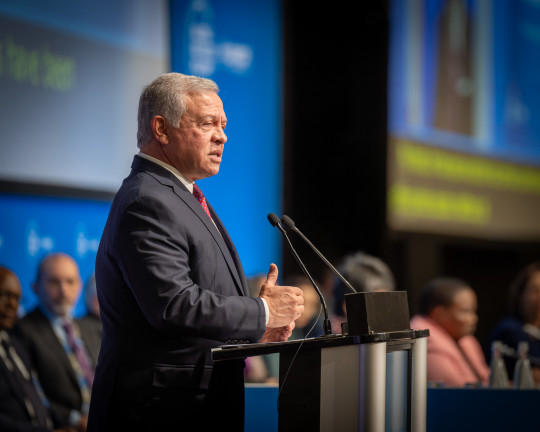
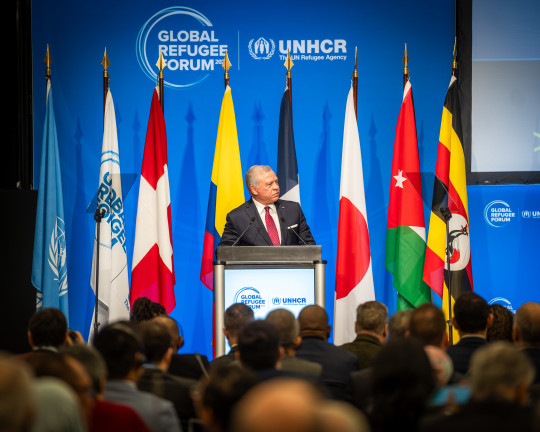
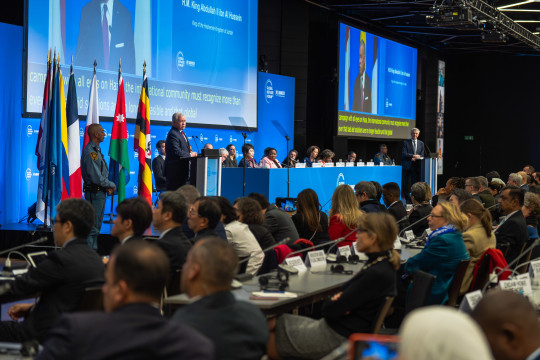
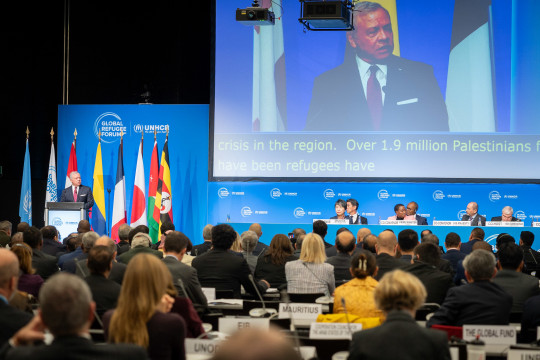
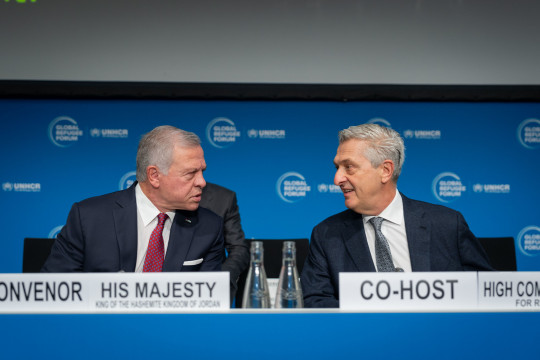
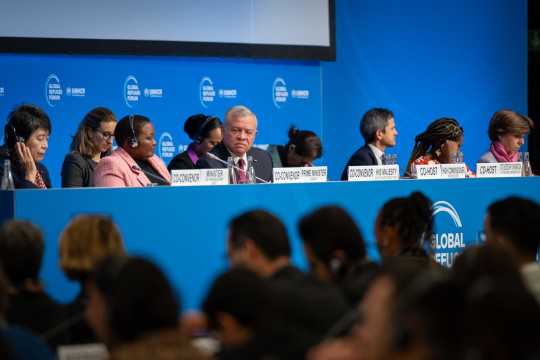
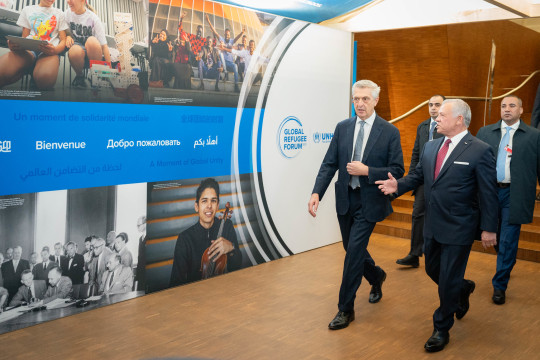
13 December 2023: King Abdullah II delivered the keynote address at the Global Refugee Forum in Geneva, co-convened by Jordan, Colombia, France, Japan and Uganda, and co-hosted by Switzerland and UNHCR.
His Majesty warned of the waning international attention to the ongoing refugee crisis.
“As serious crises compete for international attention, the plight of refugees and their host countries has taken a backseat. But this is a lapse that the international community can ill afford,” the King said.
“And now, as we speak, we find ourselves dealing with another internal displacement crisis in the region. Over 1.9 million Palestinians in Gaza, many of whom are themselves refugees, have been forced to flee their homes amid a relentless bombing campaign,” His Majesty said.
“With all eyes on Gaza, the international community must recognise, more than ever, that band-aid solutions are no longer feasible, and that global crises demand long-term responsibility-sharing,” the King added.
His Majesty said Jordan is pushing for a more coordinated humanitarian response in Gaza, and supporting the Palestinians and UNRWA “in any way we can”.
“But our country is still bearing the heavy costs and burdens of the refugee communities in our midst,” the King added, urging the international community not to leave the most vulnerable behind.
Following is the full keynote address by His Majesty:
“In the name of God, the Compassionate, the Merciful
High Commissioner Grandi,
Your Excellencies,
My Friends:
I would like to thank Switzerland and the UNHCR for co-hosting this forum. And my thanks also to our fellow co-convenor nations for recognising the need to bring the spotlight back to a major global issue, an issue Jordan is all too familiar with.
Jordan hosts nearly 4 million refugees of different nationalities, including almost 1.4 million Syrians. All in all, this is over a third of our 11 million population.
In an increasingly volatile region, welcoming refugees has become an indelible part of Jordan’s national identity. We cannot turn our backs on refugees, because that is who we are.
But Jordanians have been increasingly feeling that the world is turning its backs on them, as refugee hosts.
As serious crises compete for international attention, the plight of refugees and their host countries has taken a backseat. But this is a lapse that the international community can ill afford.
My friends,
Just a few months ago, I stood before the UN General Assembly and urged the world not to forget Syrian refugees.
And now, as we speak, we find ourselves dealing with another internal displacement crisis in the region. Over 1.9 million Palestinians in Gaza, many of whom are themselves refugees, have been forced to flee their homes amid a relentless bombing campaign.
With all eyes on Gaza, the international community must recognise, more than ever, that band-aid solutions are no longer feasible, and that global crises demand long-term responsibility-sharing.
Jordan is pushing for a more coordinated humanitarian response in Gaza. We are supporting the Palestinians and UNRWA in any way we can. But our country is still bearing the heavy costs and burdens of the refugee communities in our midst.
And let us be clear about the scope. In Jordan, UNRWA registers 2.3 million refugees; UNHCR registers more than 730,000 others; and nearly a million more are not covered by either agency.
International partners are essential, and our response plan for the Syrian refugee crisis has been world-recognised, yet, it has never been fully funded. Indeed, international funding to meet pledges has been steadily declining. So far this year, we only received around 22 percent of the response plan’s needs—the lowest level ever.
The rest is covered through Jordan’s national budget. This has raised the challenge of additional expenditures, and placed even more pressure on our strained resources, especially water, as we struggle to cope with the dual impact of the refugee crisis and climate change.
With one of the lowest water shares per capita in the world already, the challenge of covering the water needs of our people, as well as refugees, has become extremely dire. One vital mega-project we are hoping will alleviate this emergency envisions desalinating Red Sea water from the Gulf of Aqaba, and supplying it to major population areas.
And we remain committed to providing refugees with education at our schools, medical services at our hospitals, and access to livelihood opportunities, but sufficient funds are key to enable us to continue providing basic services.
With no clear long-term commitments in flexible international funding, the vulnerability of refugees and Jordanian host communities will grow even more precarious.
And the severe shortfall in funds for key agencies like the World Food Programme and UNHCR is negatively affecting the level of services, including cash assistance, education, and healthcare.
After cuts in World Food Programme assistance to vulnerable refugees this year, a deterioration in food security and self-reliance has become a painful reality for the vast majority, with 91 percent now being food insecure, compared to 63 percent before the cuts.
So my friends,
For many years, we and other host countries have been offering shelter, education, healthcare, jobs, and resources to refugees at a great cost to our own economic progress.
But we recognise that this is a long-term commitment that we are undertaking on behalf of the international community.
And likewise, the international community cannot resort to short-term solutions and move on to the next crisis.
Jordan has often warned of the dangers of leaving a lost generation behind, yet, instead of making headway in resolving this ever-evolving and expanding refugee crisis—and even as new displacement crises emerge—we see attention waning.
We cannot afford for this to continue. Our global community cannot thrive if its most vulnerable are left behind.
Let’s make this forum count.
Thank you.”
2 notes
·
View notes
Text
"qatar pledges $50 Million for emergency aid to gaza refugees. minister lolwah alkhater announced this at the global refugee forum" — via khaledbeydoun on instagram
3 notes
·
View notes
Text
Yesterday night, what’s left of the Trust and Safety team at X (formerly Twitter) announced the measures it was taking to try and curb the virulent spread of disinformation around the Israel-Hamas war on its platform.
The statement, issued three days after the conflict began, reads: “As the events continue to unfold rapidly, a cross-company leadership group has assessed this moment as a crisis requiring the highest level of response.”
One person who does not appear to be part of this crisis team is X owner Elon Musk.
Instead of tackling the dangerous disinformation problem on his platform, Musk instead spent yesterday night into this morning continuing to spread disinformation about the conflict, conversing with a known QAnon promoter, boosting anti-Muslim conspiracy theories, and laughing at a video detailing how transphobic content on X can get you new followers.
Musk also promoted a new feature that allows X Premium subscribers to see only replies from other people willing to pay $8 a month, which Musk said would “help a lot with spam bots” on the platform—an issue Musk previously claimed he had already all but eradicated.
“If successful, X will evolve to be the collective consciousness of humanity or, more accurately, the human-machine collective,” Musk posted in reply to a follower who said he was doing a great job running the company.
Meanwhile, disinformation about the conflict in the Middle East continues to rage on the platform, driven primarily by verified accounts.
Yesterday evening, X’s Trust and Safety team, which is currently leaderless after Ella Irwin resigned in June, wrote on X that it had “removed newly created Hamas-affiliated accounts” and was working with the Global Internet Forum to Counter Terrorism (GIFCT), an industry body that helps coordinate content moderation across social media platforms, to “try and prevent terrorist content from being distributed online.”
The Safety team’s statement also lauded the user-generated Community Notes system and said new accounts were being enrolled to address the flood of disinformation on the platform. The Safety team also revealed that it had removed “several hundreds accounts for attempting to manipulate trending topics.”
Since Musk took control of the platform just under a year ago, he has restructured it to encourage engagement over everything else. As a result, accounts that subscribe to X Premium now have a monetary incentive to post content that is engaging regardless of how truthful it is. This was highlighted clearly on yesterday night when, at the same time as the Safety team posted its update, a new viral piece of disinformation was spreading unchecked on X.
Sulaiman Ahmed, a self-described investigative journalist, posted the false claim that the Church of Saint Porphyrius in Gaza City, one of the oldest churches in the world, was destroyed by an Israeli bomb. The post received over 1 million views in the span of three hours.
Ahmed is a subscriber to X Premium, which means his posts are given priority in search results and newsfeeds over other users, and he also allows followers to subscribe to his content directly through X, allowing him to profit from increased engagement with his content.
Yesterday evening, the church posted an update on Facebook dismissing the claim, adding that it was taking in refugees left homeless following Israel’s bombing campaign in retaliation to the Hamas attack that began on Saturday morning.
Despite the church’s rebuttal—and Ahmed himself subsequently admitting that the church was untouched—the disinformation spread far and wide on X. WIRED conducted a search for the “Saint Porphyrius Orthodox Church” on X this morning and found that Ahmed’s original false post was the third result. Multiple other posts from verified users all repeating the lie were also promoted at the top of the results, none of which had Community Notes attached to them.
Eliot Higgins, founder of investigative journalist outlet Bellingcat, pointed out that the false information was being shared by a wide variety of accounts, all of which had one thing in common: a subscription to X Premium.
“If Musk hadn't made it so hard to research disinformation on his website, this case would be a good way to show the growing overlap of the pro-Assad, the pro-Putin, and the US alt-right griftospheres,” Higgins wrote on X, adding: “Musk hasn't given the voiceless a voice, he's just dragged us all down into the swamp, and the only people who truly benefit are shameless grifters.”
2 notes
·
View notes
Photo

This year continued to be A Lot and we decided to ensure that there were charities that directly addressed current events. Folded into this post are groups that work for aid targeting every natural disaster and man-made one, climate change, the ongoing COVID pandemic, and more. If you're looking for an organization that directly addresses any of those, this is your spotlight post.
For more information on donation methods and accepted currencies, please refer to our list of organizations page.
Center for Reproductive Rights
The Center for Reproductive Rights is the only global legal advocacy organization dedicated to ensuring reproductive rights are protected in law as fundamental human rights for the dignity, equality, health, and well-being of every person. With local partners across five continents, they have secured legal victories before national courts, UN Committees, and regional human rights bodies on issues such as access to life-saving obstetrics care, contraception, maternal health, and safe abortion services and the prevention of forced sterilization and child marriage.
Clean Air Task Force
As we've seen for a long time now but especially this year with constant natural disasters and alarming news from all over the world, climate change is real and we need to do something about it. Over the past 25 years, CATF, a group of climate and energy experts who think outside the box to solve the climate crisis, has pushed for technology innovations, legal advocacy, research, and policy changes. Their goal is to achieve a zero-emissions, high-energy planet at an affordable cost.
Coalition for Rainforest Nations
Boasting a voluntary membership of over 50 rainforest nations, CORN provides a single voice to countries that didn’t cause the climate emergency but nevertheless feel the brunt of it daily. CORN originated the global conservation mechanism Reducing Emissions from Deforestation and Degradation (REDD+) to stop deforestation. REDD+ was successfully mandated in the Paris Climate Agreement (2015) and covers 90% of the world’s tropical rainforests.
International Rescue Committee
Founded in 1933, the IRC is a long-standing trusted partner in supporting those whose lives have been upended by sudden violence, political or natural. Their main fundraising focuses right now are Pakistan and Ukraine, but they are no stranger to areas of disaster throughout the world as they currently work in 40 countries. The IRC provides emergency aid and long-term assistance, including refugee settlement, and focuses on health, education, economic well-being, empowerment, and safety.
Médecins Sans Frontières/Doctors Without Borders (MSF)
Odds are you’ve heard of MSF, the global organization that sends trained medical professionals to the places they’re needed most. MSF has been working globally for nearly 40 years, providing medical assistance to people affected by conflict, epidemics, disasters, or exclusion from healthcare—no matter what. They’re guided by principles of independence, impartiality, and neutrality to global political policies or movements.
National Asian Pacific American Women's Forum
NAPAWF is the only organization focused on building a movement for social, political, and economic change for Asian American and Pacific Islander (AAPI) women and girls. Their work focuses on policy and structural change, organizing and civic engagement, and legal advocacy and judicial strategy. They also tackle reproductive health and rights, economic justice, and immigration and racial justice.
National Network of Abortion Funds
The National Network of Abortion Funds builds power with members to remove financial and logistical barriers to abortion access by centering people who have abortions and organizing at the intersections of racial, economic, and reproductive justice. They provide their grassroots base of over 80 autonomous, diverse organizations/abortion funds with leadership development, infrastructure support, and technical assistance. Some fund procedures while others cover abortion pills, transportation, lodging, childcare, doula services, and other forms of support.
National Resource Defense Council
"We believe the world’s children should inherit a planet that will sustain them as it has sustained us. NRDC works to ensure the rights of all people to the air, the water and the wild, and to prevent special interests from undermining public interests." Since 1970, the NRDC has been a leader in legal advocacy for climate justice. They work with a staff of about 700 lawyers, scientists, and policy experts to reduce pollution and protect natural resources nationally and internationally.
Partners In Health
Founded by Paul Farmer when he was still in medical school, PIH is committed to bringing exceptional health care to every corner of the planet. PIH also works to provide access to food, transportation, housing, and other key components of healing to the most vulnerable. Their work started in Haiti but has expanded rapidly across the globe.
RIP Medical Debt
Over 100 million Americans (one in three) are struggling with paying off medical bills. COVID has only added to those numbers, putting people under significant financial burden and emotional distress. This organization buys up medical debt in order to forgive it with no tax consequences to donors or recipients. Donate just $1 and you wipe out $100 of someone's medical debt, $100 to get rid of $10,000 in debt, and so on—the ripple effect is real. Through their work, RIP Medical Help not only helps with financial relief but also brings attention to the need for a more compassionate, transparent, equitable, and affordable healthcare system.
The Solutions Project
Using grants and donations, The Solutions Project empowers grassroots leaders to build solutions, funding, and influence for the communities most affected by the climate crisis. They also provide media training and networking and leverage influencer and media relationships for their grantees. Due to the lack of representation of communities directly impacted by climate change, they aim to invest 95% of their resources to front line leaders of color and at least 80% to organizations led by women and gender nonconforming people. If The Solutions Project sounds familiar to you, it might be because Mark Ruffalo is one of the founders and he and Don Cheadle are among the board of directors!
World Central Kitchen
Started by Chef José Andrés, WCK makes sure that people are fed in the wake of natural disasters. Their programs advance human and environmental health, offer access to professional culinary training, create jobs, and improve food security. WCK also teaches food safety and cooking classes to native people who live where disasters have occurred, so they may open restaurants and support the local economy more permanently. Their current focuses are partnering with restaurants, one of the hardest-hit industries, through the pandemic (here and here) and assisting those affected by Hurricane Ian, Hurricane Fiona, floods in Pakistan, and the war in Ukraine.
17 notes
·
View notes
Text
Advancing healthcare in times of crisis

ACCESS, the largest Arab American non-profit organisation in the US, will host its 10th Arab Health Summit, a unique scientific forum drawing health professionals from around the globe to Dearborn, Michigan. This year’s theme is Advancing Health Amidst Conflict and Crisis.
As Trade Arabia News Service reports, the summit, set for October 21 to 23 at The Henry Hotel, is the only gathering in the country dedicated to deepening the understanding of the cultural and social factors influencing the health behaviours of Arab communities.
This year, it will focus on both physical and mental health conditions, especially during periods of turmoil. The summit aims to raise awareness and address the pressing health issues impacting Arab Americans in these challenging times.
Impressive array of speakers
The summit’s speaker lineup features an impressive array of public health professionals, academics, scholars, policymakers, and more. Keynote speakers include Mayor of Dearborn Abdullah H Hammoud, Dr Adnan Munkarah, Dr Mads Gilbert, Dr Rima Afifi, Dr Joseph Kolars, Dr Ali Khan and Dr Ghassan Abu-Sittah.
Speakers and panelists will address a wide range of topics, including substance use disorder, maternal and child health, health equity, immigrant and refugee health, behavioral health, health in conflict and crisis, environmental health, sexual and reproductive health, non-communicable diseases, and more.
"The Arab Health Summit is a unique opportunity to bring together researchers, academic, health and public health leaders from around the globe to address local and global health issues of Arabs during conflict and times of crisis,” said Mona Makki, Director of the ACCESS Community Health and Research Center.
0 notes
Text
Uniting for climate peace in solidarity with refugees.

The moment religious leaders from around 40 faith-based organisations worldwide agreed to keep defending the individual right to seek asylum during a gathering in Geneva marked a high point on the eve of the Global Refugee Forum, the world's biggest such international gathering.They met at a one-day event on 12 December at the World Council of Churches (WCC), chaired by an Armenian archbishop and a UN diplomat who was once a Turkish legislator.
#Global Refugee Forum#solidarity#religious leaders#faith-based organisations#right to seek asylum#refugees#World Council of Churches (WCC)
0 notes
Text

Upholding Human Rights: A Call to Action
Human rights stand as the core value of justice and equality for every individual irrespective of gender, race or economic background. Despite global progress, human rights violations still persist and efforts for advocacy remain essential.
Gender Equality: A Priority
In fighting injustices such as discrimination or violence, we must advocate for human rights— with gender equality taking precedence among issues warranting immediate attention. Women face structural barriers in many areas including work and health care aside from being exposed to physical and psychological abuse all over the world. Those campaigning should push for laws that ensure women have equal opportunities as men and that these laws also uphold social norms which empower women since these are dual strategies.
Combating Racial and Ethnic Discrimination
Fighting racial and ethnic discrimination is an important part of promoting human rights. People belonging to racial minorities often are not recognized in a fair manner along national and international laws and conventions. To promote effective advocacy, it is important that along with legislative changes we also need educational programs so that we can embrace a community which accepts diversity as one of its core principles. This implies addressing the historical inequities responsible for economic disparities and ensuring equitable access to opportunities and wealth resources.
Upholding Refugee Rights
Advocacy for human rights should also touch on the rights of migrants and refugees— often dispossessed and denied even the most basic of rights. An unprecedented global humanitarian crisis looms over us, thanks to conflicts and climate change that have uprooted millions in recent years. Advocates must ensure that international policies take the interests of displaced persons at heart: providing safe harbor, support for reintegration into host communities, all done with dignity. A responsibility for those advocating for human rights, too.
Ensuring LGBTQ+ Rights
Additionally, LGBTQ+ people's rights are regularly in jeopardy. In this field, advocacy entails opposing laws and social norms that discriminate, encouraging tolerance, and gaining legal recognition for a range of gender identities and sexual orientations. One of the most important human rights concerns is making sure that LGBTQ+ people can live freely and openly without worrying about being persecuted.
Multidimensional Advocacy
Human rights advocacy needs to be multidimensional, combining international collaboration, grassroots organizing, and legal action, in order to be effective. Human rights require the establishment and enforcement of legislative frameworks and policies. When it comes to bringing attention to issues and inspiring communities to demand change, grassroots movements are essential. Treaties and other international organizations offer crucial forums for establishing international norms and holding offenders responsible.
Education as a Catalyst
One effective strategy for promoting human rights is education. By raising awareness about human rights issues and promoting a culture of empathy and respect, advocates can foster a more informed and compassionate society. Educational programs in schools and communities can empower individuals to recognize and stand up against injustices, building a grassroots movement for human rights.
A Call to Action
In conclusion, human rights advocacy is a continuous and crucial endeavor to create a world in which each person can live with respect and dignity. Advocacy can contribute to the development of a more just and equitable society by addressing issues such as gender inequality, racial discrimination, refugee hardship, and LGBTQ+ rights. We can achieve great progress in bringing the universal ideals of human rights for all to reality through legal reforms, education, international cooperation, and grassroots mobilization.
0 notes
Text
Paul Biya Latest News: A Look at Recent Developments in Cameroon
In recent news concerning Cameroon and President Paul Biya, several significant developments have taken place that warrant attention and analysis. From political shifts to economic updates, let's delve into the latest news surrounding President Biya's administration.

1. Political Landscape: Recent months have seen a focus on political developments in Cameroon, including discussions about potential constitutional reforms and electoral processes. President Biya's administration has been under scrutiny regarding efforts to address governance challenges and promote political stability in the country. Observers are keenly watching for any updates regarding political reforms and initiatives aimed at enhancing democratic processes.
2. Economic Initiatives: Economic matters continue to be a priority for Cameroon, and President Biya's government has been working on various initiatives to boost economic growth and development. This includes infrastructure projects, investment incentives, and efforts to diversify the economy. The latest news may include updates on economic indicators, trade agreements, and policies related to job creation and business opportunities.
3. Social and Humanitarian Issues: Cameroon faces several social and humanitarian challenges, including issues related to healthcare, education, and social welfare. Recent news may highlight efforts by the Biya administration to address these concerns, such as healthcare reforms, education initiatives, and support for vulnerable populations. Additionally, developments in areas like refugee assistance and humanitarian aid may be part of the latest updates.
4. International Relations: The international relations front is also of significance, with Cameroon's engagements with other countries and international organizations shaping the geopolitical landscape. President Biya's administration's diplomatic efforts, trade partnerships, and participation in regional and global forums are topics that feature in the latest news related to Cameroon's foreign policy.
5. Environmental Concerns: Environmental conservation and sustainability are increasingly crucial topics globally, and Cameroon is no exception. Recent news may cover initiatives, policies, and challenges related to environmental protection, wildlife conservation, climate change mitigation, and sustainable development efforts championed by President Biya's government.
Conclusion
The latest news regarding Paul Biya and Cameroon encompasses a range of topics spanning politics, economics, social issues, international relations, and environmental concerns. Staying informed about these developments is essential for understanding the dynamics and progress in Cameroon under President Biya's leadership.
0 notes
Text
Today we join our voices again to urge all States to push forward in the fight against racial discrimination.

“The commemoration of the International Day for the Elimination of Racial Discrimination is a moment to take stock of the persistent gaps in the implementation of our shared commitment to protect hundreds of millions of people whose human rights continue to be violated due to racial discrimination. It is also an opportunity to recommit to our promise to fight all forms of racism everywhere.
Through our work, we see clearly that racism, racial discrimination, xenophobia, and related intolerance continue to be a cause of conflict around the world. We are witnessing a dangerous regression in the fight against racism and racial discrimination in many spaces. Minorities, people of African descent, people of Asian descent, Indigenous Peoples, migrants, including asylum seekers and refugees, are particularly vulnerable as they often face discrimination in all aspects of their lives based on their racial, ethnic or national origin, skin colour or descent. In this regard, it is crucial that States implement their international human rights obligations and commitments under the International Convention on the Elimination of All Forms of Racial Discrimination and the Durban Declaration and Programme of Action.
Initiatives aimed at revitalising multilateralism, including the Summit of the Future, provide an important opportunity to firmly establish the collective responsibility of States in ensuring concrete progress to address structural and systemic racial discrimination and its root causes.
The proclamation of an International Decade for people of African Descent in 2014 marked a significant milestone in the global effort to combating systemic racism and racial discrimination faced by people of African descent worldwide.
As the International Decade comes to an end, it is time to confront and rectify the pervasive obstacles and barriers hampering recognition, justice, and development for people of African descent. We call on States to respond to growing calls for reparatory justice and economic empowerment for people of African descent. We also call on States to leave no person of African descent behind in their efforts to realise the Sustainable Development Goals.
Today we join our voices again to urge all States to push forward in the fight against racial discrimination. We also call on States to proclaim a second International Decade for People of African Descent, to ensure greater recognition, justice, and development for people of African descent, including by engaging meaningfully in reparatory justice processes for past injustices.”
*The experts: Ms. Ashwini K.P., Special Rapporteur on contemporary forms of racism, racial discrimination, xenophobia and related intolerance; Ms. Tracie L. Keesee and Mr. Juan E. Méndez, Experts of the International Independent Expert Mechanism to Advance Racial Justice and Equality in the context of Law Enforcement; Ms. Barbara Reynolds, Chairperson, Working Group of Experts on People of African Descent; Ms. Verene Shepherd, Chairperson, Committee on the Elimination of Racial Discrimination, Ms. June Soomer, Chairperson-Designate, Permanent Forum on People of African Descent; and Ms. Hanna Suchocka, Chairperson, Group of Independent Eminent Experts on the Implementation of the Durban Declaration and Programme of Action
For further information and media enquiries, please contact: Niraj Dawadi ([email protected])
#International Day for the Elimination of Racial Discrimination#21 march#racial inequality#Special Rapporteur on contemporary forms of racism#International Independent Expert Mechanism to Advance Racial Justice and Equality in the context of Law Enforcement#Working Group of Experts on People of African Descent#Committee on the Elimination of Racial Discrimination#Permanent Forum on People of African Descent#Group of Independent Eminent Experts on the Implementation of the Durban Declaration and Programme of Action#statements
0 notes
Text
Dags att sätta stopp för UNRWA:s jihad mot Israel
Bassam Tawil
Det är nu tydligt att FN-cheferna ljög när de sa att de var ovetande om sina anställdas inblandning i terrorgrupper. Faktum är att de kände till det men gjorde sitt yttersta för att blidka Hamas. På bilden: UNRWA:s generalkommissionär Philippe Lazzarini talar på Global Refugee Forum i Genève, Schweiz, den 13 december 2023. (Foto av Jean-Guy Python/Pool/AFP via Getty…

View On WordPress
0 notes